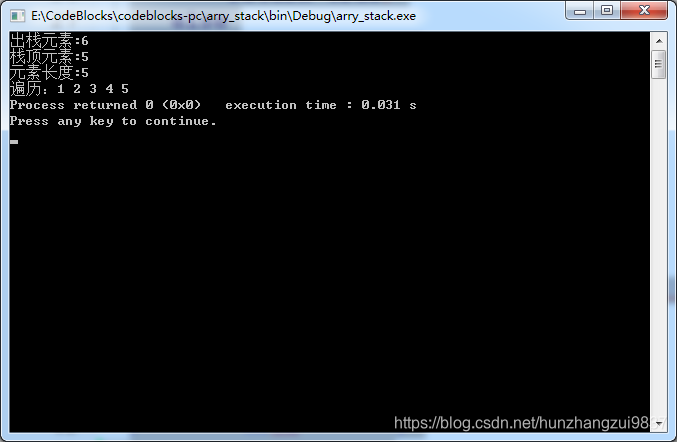方法一:结构体实现
#include <iostream>
using namespace std;
typedef struct{
int d[10];
int top;
}Stack;
/****初始化一个栈*****/
void init(Stack *s){
s->top=-1;
}
/****判断是否为空 ****/
bool em(Stack *s){
if(-1==s->top)
return true;
else
return false;
}
/****判断是否为满 ****/
bool full(Stack * s){
if(9==s->top)
return true;
else
return false;
}
/*******入栈*******/
bool push(Stack *s,int a){
if(full(s)) //满了就不能入栈
return false;
else{
s->top++; //指针先加
s->d[s->top]=a;//再把数据存进对应的“格子”
return true;
}
}
/*******出栈*******/
int pop(Stack *s){
if(em(s)) //空的当然不能出栈
return -1;
else{
int tmp=s->d[s->top]; //把栈顶元素付给中间变量
s->top--; //指针减一
return tmp;
}
}
/****取栈顶元素****/
int top(Stack *s){
int a;
if(em(s)) //同理空栈没有元素就不行
return false;
else{
a=s->d[s->top]; //把栈顶的元素赋值即可
return a;
}
}
/****取有效元素长度****/
int len(Stack *s){
return s->top+1;
}
/*****遍历*****/
void ergodic(Stack *s){
cout <<"遍历:";
for(int i=0;i<=s->top;i++)
cout << s->d[i]<<" ";
}
int main(){
Stack s;
int a,lens;
init(&s);
push(&s,1);
push(&s,2);
push(&s,3);
push(&s,4);
push(&s,5);
push(&s,6);
int p =pop(&s);
a = top(&s); //取栈顶元素
lens = len(&s); //长度
cout <<"出栈元素:"<<p<< endl;
cout <<"栈顶元素:"<<a<< endl;
cout <<"元素长度:"<<lens<< endl;
ergodic(&s); //遍历
return 0;
}
测试:

方法2:封装成class
#include <iostream>
#define MAX 10
using namespace std;
class Stack{
private:
int top;
int a[MAX];
public:
Stack();
bool Empty();
bool full();
bool push(int a);
int pop();
bool bianli();
};
Stack::Stack(){
this->top = -1;
}
bool Stack::Empty(){
if(this->top==-1)
return true;
return false;
}
bool Stack::full(){
if(this->top==9)
return true;
return false;
}
bool Stack::push(int a){
if(full())
return false;
this->top++;
this->a[this->top] = a;
return true;
}
bool Stack::bianli(){
if(Empty())
return false;
for(int i=0;i<=this->top;i++){
cout << this->a[i]<<" ";
}
return true;
}
int Stack::pop(){
if(Empty())
return false;
int a = this->a[this->top];
this->top--;
return a;
}
int main()
{
Stack s;
s.push(1);
s.push(2);
s.push(3);
s.push(4);
int b = s.pop();
cout <<"出栈元素:"<< b << endl;
cout <<"遍历:";
s.bianli();
return 0;
}
测试:


